[高中英语]高中英语必修一Unit+3+Travel+journal+教案+
- 格式:doc
- 大小:52.50 KB
- 文档页数:7
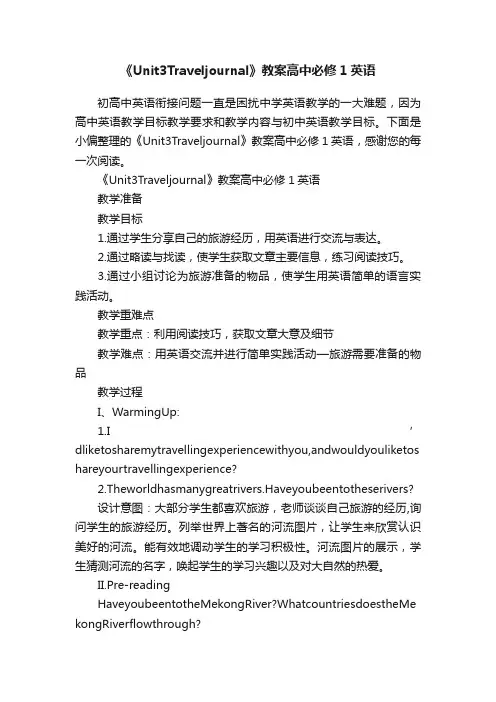
《Unit3Traveljournal》教案高中必修1英语初高中英语衔接问题一直是困扰中学英语教学的一大难题,因为高中英语教学目标教学要求和教学内容与初中英语教学目标。
下面是小偏整理的《Unit3Traveljournal》教案高中必修1英语,感谢您的每一次阅读。
《Unit3Traveljournal》教案高中必修1英语教学准备教学目标1.通过学生分享自己的旅游经历,用英语进行交流与表达。
2.通过略读与找读,使学生获取文章主要信息,练习阅读技巧。
3.通过小组讨论为旅游准备的物品,使学生用英语简单的语言实践活动。
教学重难点教学重点:利用阅读技巧,获取文章大意及细节教学难点:用英语交流并进行简单实践活动—旅游需要准备的物品教学过程I、WarmingUp:1.I’dliketosharemytravellingexperiencewithyou,andwouldyouliketos hareyourtravellingexperience?2.Theworldhasmanygreatrivers.Haveyoubeentotheserivers?设计意图:大部分学生都喜欢旅游,老师谈谈自己旅游的经历,询问学生的旅游经历。
列举世界上著名的河流图片,让学生来欣赏认识美好的河流。
能有效地调动学生的学习积极性。
河流图片的展示,学生猜测河流的名字,唤起学生的学习兴趣以及对大自然的热爱。
II.Pre-readingHaveyoubeentotheMekongRiver?WhatcountriesdoestheMe kongRiverflowthrough?设计意图:展示沿湄公河的地图,引起学生的兴趣,让学生观察地图,说出湄公河流经的国家,为随后的阅读做好了内容和词汇上的铺垫。
III.Reading1.SkimmingSkimthepassageandfindthemainideaforeachparagraphPara1:DreamPara2:AstubbornsisterPara3:Preparation设计意图:略读:学生快速浏览课文,寻找相关信息并搭配段落大意。
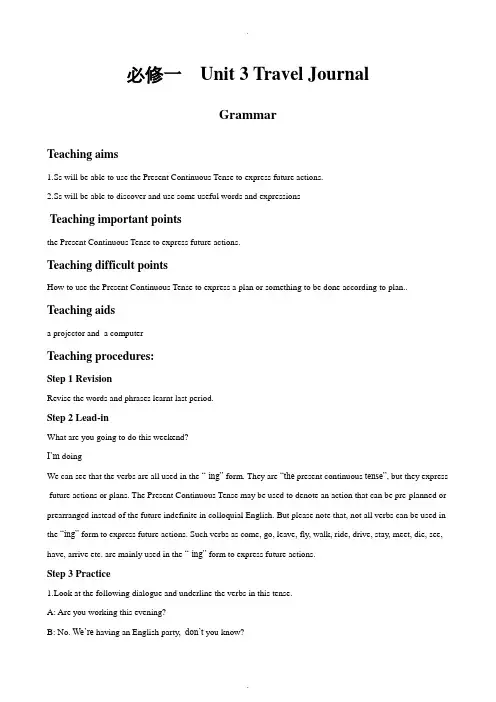
必修一Unit 3 Travel JournalGrammarTeaching aims1.Ss will be able to use the Present Continuous Tense to express future actions.2.Ss will be able to discover and use some useful words and expressionsTeaching important pointsthe Present Continuous Tense to express future actions.Teaching difficult pointsHow to use the Present Continuous Tense to express a plan or something to be done according to plan.. Teaching aidsa projector and a computerTeaching procedures:Step 1 RevisionRevise the words and phrases learnt last period.Step 2 Lead-inWhat are you going to do this weekend?I’m doingWe can see that the verbs are all used in the “-ing” form. They are “the present continuous tense”, but they express future actions or plans. The Present Continuous Tense may be used to denote an action that can be pre-planned or prearranged instead of the future indefinite in colloquial English. But please note that, not all verbs can be used in the “ing” form to express future actions. Such verbs as come, go, leave, fly, walk, ride, drive, stay, meet, die, see, have, arrive etc. are mainly used in the “-ing” form to express future actions.Step 3 Practice1.Look at the following dialogue and underline the verbs in this tense.A: Are you working this evening?B: No. We’re having an English party, don’t you know?A: Yes, I do. And we’re giving some performance at the party. What are you going to do? B: I’m singing song wit h my classmates. 2. Doing exercises No. 2 and 3 on page 21Now turn to page 21 and do exercise 2. In the dialogue a newspaper reporter is interviewing Wang Wei about her plans for the trip along the Mekong River. However, they are not sure about some of the verb tenses. Can you help them complete their conversation?Let’s continue to do exercise 3. Do you have any plans for the future yourselves? If you have any, please use the P resent Continuous Tense to express your future actions. Give as much information as you can.Step4 Dialogue1. First show an example: Where you going on holiday?A: Yanzi, where you going on holiday? B: I’ m going to Laos. A: When are you leaving? B: Next Sund ay. A: How are you going to Laos? B: I’m taking a plane. A: How long are you staying there? B: About two weeks. A: Great. Have a good trip. B: Thanks. Farewells:Have a good trip/ journey; Have a good day/ time; Enjoy yourself; Best wishes; Have fun; Good luck; Take care!Step5 HOMEWORKDo exercises on Page 56, 57。
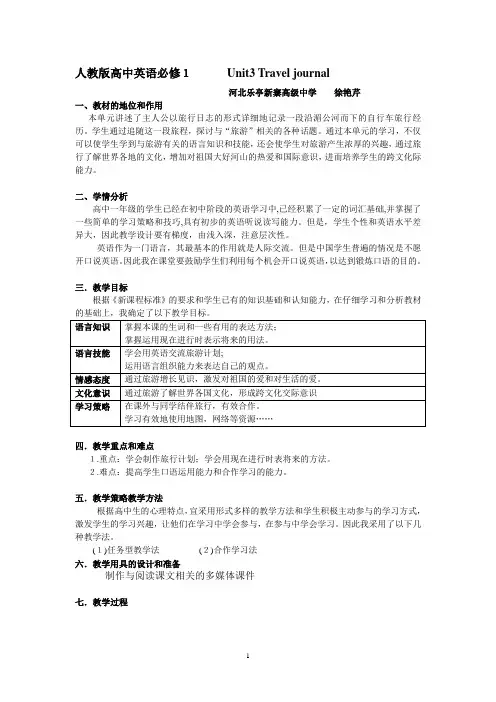
人教版高中英语必修1Unit3 Travel journal河北乐亭新寨高级中学徐艳芹一、教材的地位和作用本单元讲述了主人公以旅行日志的形式详细地记录一段沿湄公河而下的自行车旅行经历。
学生通过追随这一段旅程,探讨与“旅游”相关的各种话题。
通过本单元的学习,不仅可以使学生学到与旅游有关的语言知识和技能,还会使学生对旅游产生浓厚的兴趣,通过旅行了解世界各地的文化,增加对祖国大好河山的热爱和国际意识,进而培养学生的跨文化际能力。
二、学情分析高中一年级的学生已经在初中阶段的英语学习中,已经积累了一定的词汇基础,并掌握了一些简单的学习策略和技巧,具有初步的英语听说读写能力。
但是,学生个性和英语水平差异大,因此教学设计要有梯度,由浅入深,注意层次性。
英语作为一门语言,其最基本的作用就是人际交流。
但是中国学生普遍的情况是不愿开口说英语。
因此我在课堂要鼓励学生们利用每个机会开口说英语,以达到锻炼口语的目的。
三.教学目标根据《新课程标准》的要求和学生已有的知识基础和认知能力,在仔细学习和分析教材四.教学重点和难点1.重点:学会制作旅行计划;学会用现在进行时表将来的方法。
2.难点:提高学生口语运用能力和合作学习的能力。
五.教学策略教学方法根据高中生的心理特点,宜采用形式多样的教学方法和学生积极主动参与的学习方式,激发学生的学习兴趣,让他们在学习中学会参与,在参与中学会学习。
因此我采用了以下几种教学法。
(1)任务型教学法(2)合作学习法六.教学用具的设计和准备制作与阅读课文相关的多媒体课件七.教学过程Step1 Lead in 导入学习这节课时,学生们不久前正好从国庆节休假回来,可以充分利用这个机会,以两人对话或小组的形式来讲述每个人旅行经历,有条件的话可以和大家分享照片和视频,让他们也可以感受其中的乐趣并了解更多的旅游知识,从而引入本节课的主题:旅行计划以及旅行前的准备。
设计意图:旅游是学生比较感兴趣的话题,用这个和学生生活密切相关的话题和经历来引起学生的学习兴趣和热情。
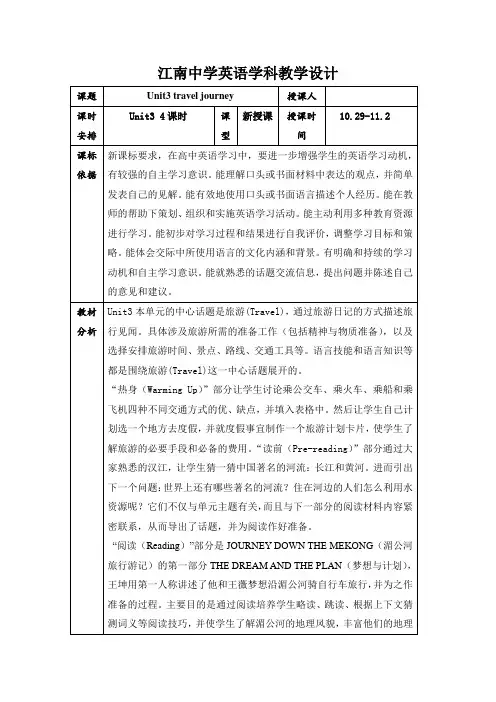
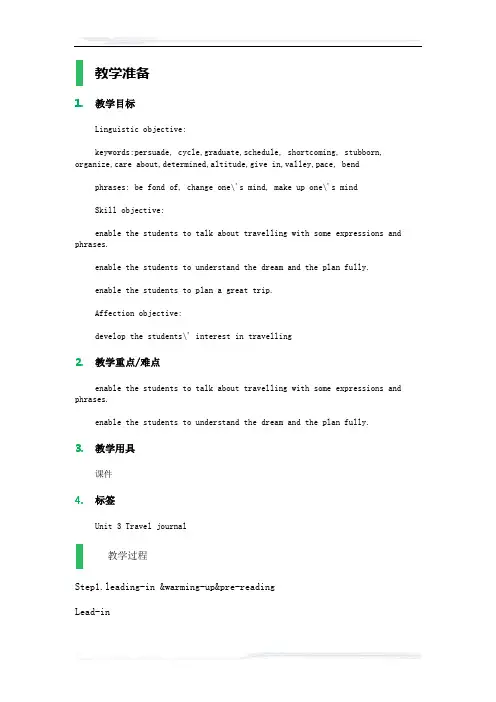
教学准备1. 教学目标Linguistic objective:keywords:persuade, cycle,graduate,schedule, shortcoming, stubborn, organize,care about,determined,altitude,give in,valley,pace, bendphrases: be fond of, change one\'s mind, make up one\'s mindSkill objective:enable the students to talk about travelling with some expressions and phrases.enable the students to understand the dream and the plan fully.enable the students to plan a great trip.Affection objective:develop the students\' interest in travelling2. 教学重点/难点enable the students to talk about travelling with some expressions and phrases.enable the students to understand the dream and the plan fully.3. 教学用具课件4. 标签Unit 3 Travel journal教学过程Step1.leading-in &warming-up&pre-readingLead-into begin the class with the theme song of 'journey to the west' to arouse the students' interest in travelling and ask the student whether they like travelling and why.Lead the students to realizethat they may suffer, get injured or enjoy a lot while travelling and help them build up an idea that it is necessary to make a plan before starting a trip.Warming-upquestion:Why do you like travelling?Task:answer teacher' question with the help of Chinese hint(提示)Because travelling can help me________发展友谊_________开拓眼________增长知识Because i can _________________in the travelling(享受美景)_________________享受生活———————获得乐趣What else?_________________了解风俗文化Pre-readingfinish the exercise about the Mekong river's background on P34 of the book《名师伴你行》Step2 Fast-readingto get the main idea of the passage and each paragraph and tell howfinish the exercise of the choice and matching line on P35(选择和连线)step3 Careful-readingPara1. main idea: the dream of taking a great bike triptask: in order to make the dream come true, what did we do ?list outa series of facts according to the ____clue(线索)。
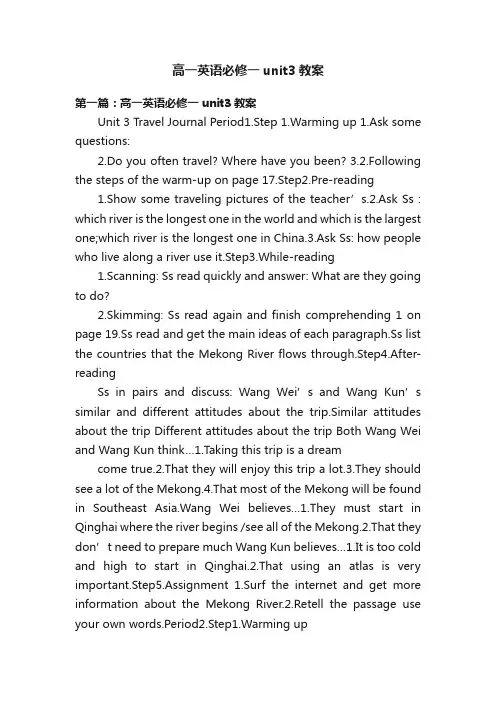
高一英语必修一unit3教案第一篇:高一英语必修一unit3教案Unit 3 Travel Journal Period1.Step 1.Warming up 1.Ask some questions:2.Do you often travel? Where have you been?3.2.Following the steps of the warm-up on page 17.Step2.Pre-reading1.Show some traveling pictures of the teacher’s.2.Ask Ss : which river is the longest one in the world and which is the largest one;which river is the longest one in China.3.Ask Ss: how people who live along a river use it.Step3.While-reading1.Scanning: Ss read quickly and answer: What are they going to do?2.Skimming: Ss read again and finish comprehending 1 on page 19.Ss read and get the main ideas of each paragraph.Ss list the countries that the Mekong River flows through.Step4.After-readingSs in pairs and discuss: Wang Wei’s and Wang Kun’s similar and different attitudes about the trip.Similar attitudes about the trip Different attitudes about the trip Both Wang Wei and Wang Kun think…1.Taking this trip is a dreamcome true.2.That they will enjoy this trip a lot.3.They should see a lot of the Mekong.4.That most of the Mekong will be found in Southeast Asia.Wang Wei believes…1.They must start in Qinghai where the river begins /see all of the Mekong.2.That they don’t need to prepare much Wang Kun believes…1.It is too cold and high to start in Qinghai.2.That using an atlas is very important.Step5.Assignment 1.Surf the internet and get more information about the Mekong River.2.Retell the passage use your own words.Period2.Step1.Warming upAsk some Ss to retell the passage that they have learnt last period.Step2.Learning about the languageTeacher explains some language points in the text on page 18.1.Persuade sb.into /out of sth.: cause sb.(not)to do sth.by arguing or reasoning with him 说服或劝说某人(不)做某事He is easily persuaded.Wang Kun couldn’t persuade his sister to change her mind.persuade sb.(that clause): cause sb.to believe sth.;convince sb.使某人信服How can I persuade you that I am telling the truth?2.insist(v.): demand(sth)forcefully, not accepting a refusal 坚持或坚决要求;eg.Since he insisted, I had to stay.insist on sth/doing sth: require or demand;refuse to accept an alternative 一定要(某事物),坚决主张She insists on getting up early and playing her radio loud.3.care about: be worried, concerned or interested 忧虑,关心,惦念don’t you care about anybody? I don’t care about what happens to him.care for /to do: be willing or agree to do sth.;wish or like to do sth.Would you care a drink? Would you care to go for a walk? care for sb.1).Like or love sb.He cares for her deeply.2).Look after sb;take care of sb;be responsible for sb Who will care for your child if you are out?4.Once she has made up her mind, nothing can change it.她一旦下了决心,什么也不能使她改变。
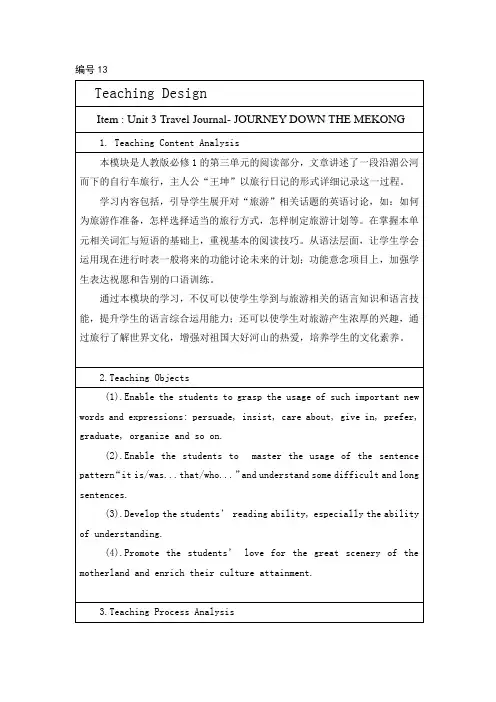
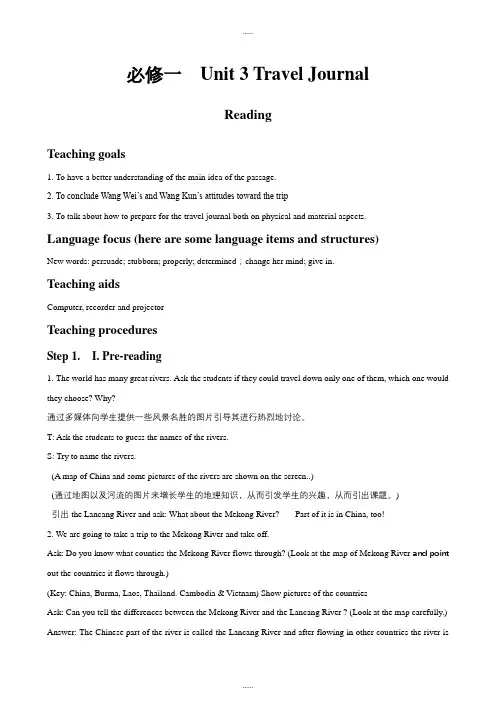
必修一Unit 3 Travel JournalReadingTeaching goals1. To have a better understanding of the main idea of the passage.2. To conclude Wang Wei’s and Wang Kun’s attitudes toward the trip3. To talk about how to prepare for the travel journal both on physical and material aspects.Language focus (here are some language items and structures)New words: persuade; stubborn; properly; determined;change her mind; give in.Teaching aidsComputer, recorder and projectorTeaching proceduresStep 1. I.Pre-reading1. The world has many great rivers. Ask the students if they could travel down only one of them, which one would they choose? Why?通过多媒体向学生提供一些风景名胜的图片引导其进行热烈地讨论。
T: Ask the students to guess the names of the rivers.S: Try to name the rivers.(A map of China and some pictures of the rivers are shown on the screen..)(通过地图以及河流的图片来增长学生的地理知识,从而引发学生的兴趣,从而引出课题。
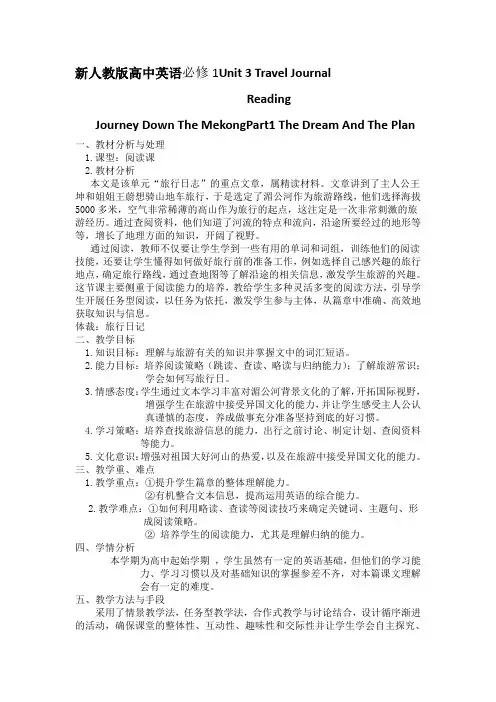
新人教版高中英语必修1Unit 3 Travel JournalReadingJourney Down The MekongPart1 The Dream And The Plan一、教材分析与处理1.课型:阅读课2.教材分析本文是该单元“旅行日志”的重点文章,属精读材料。
文章讲到了主人公王坤和姐姐王蔚想骑山地车旅行,于是选定了湄公河作为旅游路线,他们选择海拔5000多米,空气非常稀薄的高山作为旅行的起点,这注定是一次非常刺激的旅游经历。
通过查阅资料,他们知道了河流的特点和流向,沿途所要经过的地形等等,增长了地理方面的知识,开阔了视野。
通过阅读,教师不仅要让学生学到一些有用的单词和词组,训练他们的阅读技能,还要让学生懂得如何做好旅行前的准备工作,例如选择自己感兴趣的旅行地点,确定旅行路线,通过查地图等了解沿途的相关信息,激发学生旅游的兴趣。
这节课主要侧重于阅读能力的培养,教给学生多种灵活多变的阅读方法,引导学生开展任务型阅读,以任务为依托,激发学生参与主体,从篇章中准确、高效地获取知识与信息。
体裁:旅行日记二、教学目标1.知识目标:理解与旅游有关的知识并掌握文中的词汇短语。
2.能力目标:培养阅读策略(跳读、查读、略读与归纳能力);了解旅游常识;学会如何写旅行日。
3.情感态度:学生通过文本学习丰富对湄公河背景文化的了解,开拓国际视野,增强学生在旅游中接受异国文化的能力,并让学生感受主人公认真谨慎的态度,养成做事充分准备坚持到底的好习惯。
4.学习策略:培养查找旅游信息的能力,出行之前讨论、制定计划、查阅资料等能力。
5.文化意识:增强对祖国大好河山的热爱,以及在旅游中接受异国文化的能力。
三、教学重、难点1.教学重点:①提升学生篇章的整体理解能力。
②有机整合文本信息,提高运用英语的综合能力。
2.教学难点:①如何利用略读、查读等阅读技巧来确定关键词、主题句、形成阅读策略。
②培养学生的阅读能力,尤其是理解归纳的能力。
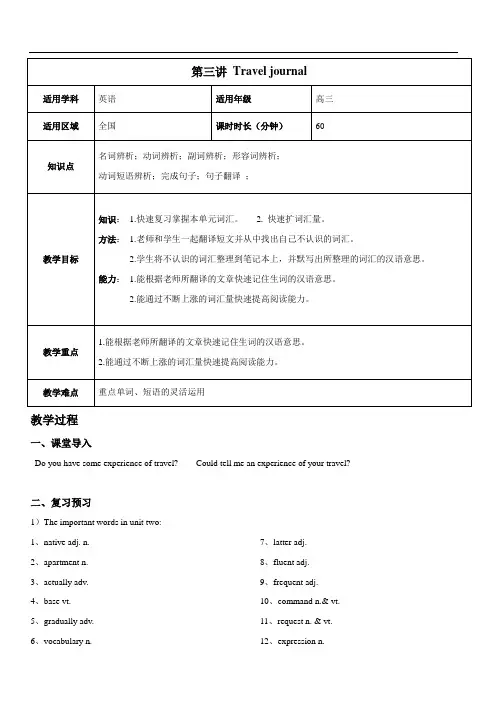
教学过程一、课堂导入Do you have some experience of travel? Could tell me an experience of your travel?二、复习预习1)The important words in unit two:1、native adj. n. __________2、apartment n. __________3、actually adv. __________4、base vt. ______________5、gradually adv. _________6、vocabulary n. _________7、latter adj. ____________8、fluent adj. _______________9、frequent adj. _____________10、command n.& vt. ________11、request n. & vt. __________12、expression n. ____________ 第三讲Travel journal适用学科英语适用年级高三适用区域全国课时时长(分钟)60 知识点名词辨析;动词辨析;副词辨析;形容词辨析;动词短语辨析;完成句子;句子翻译;教学目标知识:1.快速复习掌握本单元词汇。
2. 快速扩词汇量。
方法:1.老师和学生一起翻译短文并从中找出自己不认识的词汇。
2.学生将不认识的词汇整理到笔记本上,并默写出所整理的词汇的汉语意思。
能力:1.能根据老师所翻译的文章快速记住生词的汉语意思。
2.能通过不断上涨的词汇量快速提高阅读能力。
教学重点1.能根据老师所翻译的文章快速记住生词的汉语意思。
2.能通过不断上涨的词汇量快速提高阅读能力。
教学难点重点单词、短语的灵活运用【答案】1.本国的;本地的n. 本地人;本国人2. <美> 公寓住宅;单元住宅3. 实际上;事实上4. 以…为根据n. 基部;基地;基础5. 逐渐地;逐步地6. 词汇;词汇量;词表7.较后的;后半的;(两者中)后者的8.流利的;流畅的9.频繁的;常见的10.命令;指令;掌握11. 请求;要求12.词语;表示;表达2)The important phrases in unit two:1、because of ________2、come up _________3、at present _________4、make use of ____________5、such as ________________6、play a part (in) __________【答案】1、因为;由于2、走近;上来;提出3、现在;目前4、利用;使用5、例如6、扮演一个角色;参与三、知识讲解翻译下面由本单元词汇所编成的故事学生将在翻译过程中不会的词汇用横线标出.(一)The passageA Hard Trip一次辛苦的旅行My sister was fond of traveling. Ever since graduating, she had been determined to organize a trip to an old temple. Since transport ing fare was expensive, she decided to use a bicycle to cycle there not caring about the disadvantage s. Her stubborn attitude was always her shortcoming. Once she made up her mind to do something, no one could persuade her to change her mind. Finally, we gave in as usual though we prefer red to take a train. After we prepared everything, including the schedule, reliable weather forecast and the insurance, we began our trip.Our journey was along a river flow ing from a high altitude. Our pace was slow because the river frequently had many sharp bend s through deep valley s, where the water seemed to boil. Just as I recorded in my journal, it was really ahard journey. But we also enjoyed great view s. One night, I put my head on my pillow--a parcel of wool coats, and lay beneath the stars. When the flame in front of our cave went out at midnight, I found the sky so beautiful 我的妹妹很喜欢旅行。
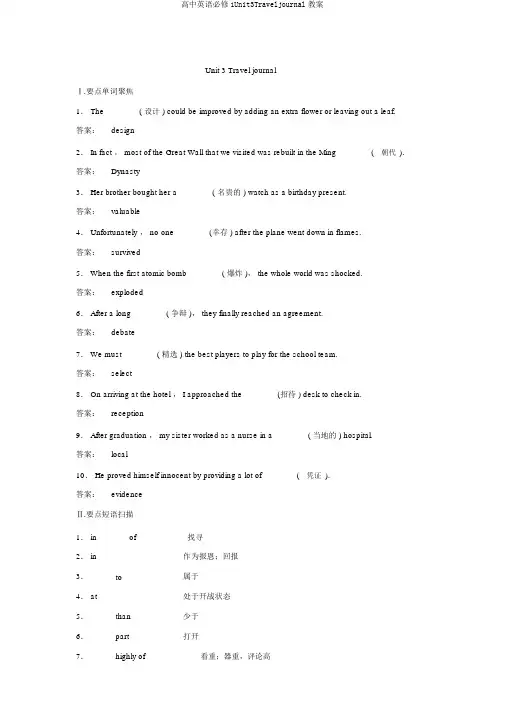
Unit 3 Travel journalⅠ.要点单词聚焦1. The________( 设计 ) could be improved by adding an extra flower or leaving out a leaf.答案:design2. In fact , most of the Great Wall that we visited was rebuilt in the Ming________(朝代).答案:Dynasty3. Her brother bought her a________( 名贵的 ) watch as a birthday present.答案:valuable4. Unfortunately , no one________(幸存 ) after the plane went down in flames.答案:survived5. When the first atomic bomb________( 爆炸 ), the whole world was shocked.答案:exploded6. After a long________( 争辩 ), they finally reached an agreement.答案:debate7. We must________( 精选 ) the best players to play for the school team.答案:select8. On arriving at the hotel , I approached the________(招待 ) desk to check in.答案:reception9. After graduation , my sister worked as a nurse in a________( 当地的 ) hospital.答案:local10. He proved himself innocent by providing a lot of________(凭证).答案:evidenceⅡ.要点短语扫描1. in of找寻2. in作为报恩;回报3.to属于4. at处于开战状态5.than少于6.part打开7.highly of看重;器重,评论高8. care关怀;在意searchreturnbelongwarlesstakethinkabout9.than而不是10. do11. be for 理⋯⋯ratherwithdesignedⅢ.文原句打破1.普士国王腓特烈·威廉一世不行能想到他送俄斯人民的重礼竟会有一段令人诧异的史。
Unit 3 Travel journal 阅读教学案教学内容Learning aims:1.To talk about the topic of Travel journal.2.To master the main idea of the text. Learning key points:To know the routine of the travel. Learning difficult points:To master the main idea of the text. 教学设计【课前预习】1.Do you like travel? Why do people like to travel so much?relax oneself enjoy scenery experience different livesenrich knowledge Make new friends2. If you are fortunate enough to travel, how are you getting there, by bus, train, ship or airplane? Let’sthink about the advantages and disadvantages of each form of transportation.【自主合作探究】Step 1 Fast—reading1. Read the whole passage quickly and decide which is the main idea of the passage. _______A. The dream of Wang Kun and Wang Wei and their preparation for the bike trip.B. Their dream and the journey down the Mekong.C. Their plan to travel down the Mekong and the attitudes of two peopleD. The proper trip down the Mekong.2. Match the paragraph and the main idea.Para 1 Different attitudes between themPara 2 Take a great bike trip along the Mekong River.Para 3 The preparation before the trip & details about Mekong River 课前请了解本单元课文背景Step 2: Careful readingPara.11 What did Wang Kun and his sister dream about ?2 When did they finally get the chance to do it?3 What idea did Wang Wei have?Para.2Is it easy to travel along the Mekong river? Why?Source of the riveraltitudeairweatherPara.3How does the scenery change when you travel along the Mekong?At first…Then…Sometimes…After…As…At last…【当堂达标】Summary:Wang Kun and Wang Wei have _________ about taking a great bike trip. when they __________ from college, they _______ to _____ along the Mekong River with their ________. Wang Wei is very _________. Once she is __________ to do something she will never _______ her mind. Although it is difficult to travel along the Mekong River by bike, she ________ that they find the ________ of the river and begin their journey there.【总结提升】DiscussionMake a plan for your trip1. Where are you going to?2. How are you going to...?4. When are you leaving?5. What are you going to take with you?6. Where are you staying??7. How long are you staying in…8. When are you coming back?【拓展延伸】Step6.Homework (Group work——Discussion)Read the text again and find the useful words and expressions答案:Fast—reading:1. A2. Para l—Take a great---Para 2---Different---Para3---The preparation---Careful—reading1. Taking a great bike trip.2. After graduating from college.3. To cycle along- the entire Mekong River.Para 2:Qinghai Province; more than 5000metresrhard to breathe; very cold Summary:Dreamed: graduated: decided: cycle; cousins; stubborn; determined; change: insisted; source。
教学准备1. 教学目标Knowledge aims:1. Get the students to go over useful new words and expressions.2. Have the students review the grammar:the Present Continuous Tense for future actions.Ability aims:1. Develop the students’ ability to use the important language points.2. Enable the students to learn to express good wishes and farewells.Emotional aims:1. Get the students to keep a travel journal when they go on a journey.2. Enable the students learn to make a trip plan and find a place to travel.2. 教学重点/难点教学重点:Get the students to review and consolidate what they have learned in this unit.教学难点:Get the students to turn what they have learned into their ability.3. 教学用具课件4. 标签Unit 3 Travel journal教学过程Step 1 Revision1. Check the homework exercises.2. Dictate some new words and useful expressions.→Step 2 Lead-inTell the students:Up to now, we have finished Unit 3. Have you learned and grasped all in this unit? Turn to Page 24. You can check yourself by filling in the blanks in the part Summing Up.→Step 3 Summing UpFive minutes for the students to sum up by themselves. Then check and explain something where necessary.Suggested answers:Write down what you have learned about traveling.(The students’ answer may vary. )We have mainly learned about planning for a trip and solving problems after the trip has begun.From this unit you have also learneduseful verbs:transport, cycle, persuade, insist, determine, camp, recorduseful nouns:journal, fare, transport, Vietnam, altitude, valley, attitude, shorts, camp, record, topicuseful adjectives:stubborn, proper, determined, familiar, braveother expressions:change one’s mind, give innew grammar item:the Present Continuous Tense for future actions→Step 4 Word and expression exercises1. Show the following exercises on the screen or give out the exercise papers.1)Fill in the blanks to complete the following sentences.(1)Mary is such a______________ (固执的)girl that no onecan______________ (说服)her to do anything.(2)He______________ (坚持)that she be invited to the party.(3)I want you to tell me the main points now; leave the______________ (详情)till later.(4)When I told her that our journey would begin at an______________ (海拔)of more than 4500 meters, she seemed to be excited.(5)He______________ (记录)the important events and his afterthoughts in his travel journey.(6)Once she___________ ___________ ___________ ____________ (拿定主意), she’ll never_________ ____________ ____________ (改变主意).(7)The enemy is surrounded, and must soon______________ (投降).(8)The people in that country fought bravely for freedom andthey____________ _____________ (决心)to drive the enemy out of their land.(9)The topic of a travel journal can__________ _________________________ (与……不同)a diary, often including people, things, and events less__________ ___________ (为……所熟悉)the readers.(10)_________ _________ (与……比起来)what she had already, the new stamps were not very interesting.2)Fill in the blanks to complete the passage.Mekong River begins______________ a glacier on a Tibetan mountain. At first, the river is______________ and the water is______________. Then it begins to move______________. It becomes __________as it passes ______________deep______________, traveling___________ western Yunnan Province. Sometimes the river______________ wide valley and becomes a______________ . We were both surprised to learn that half of the river is in China. After it leaves China and thehigh______________, the Mekong becomes______________, brown and warm. As it enters Southeast Asia, it travels slowly ______________hills and low valleys, and the______________ where rice grows. At last the river’s______________ enters the South China Sea.2. Ask the students to do the exercises. Several minutes later, check the answers and deal with any problems where necessary.Suggested answers:1)(1)stubborn; persuade (2)insisted (3)details (4)altitude(5)recorded (6)makes up her mind; change her mind (7)give in(8)were determined (9)be different from; familiar to (10)Compared with/to2)at; small; clear and cold; quickly; rapids; through; valleys; across; enters; waterfall; altitudes; wide; through; plains; delta→Step 5 Grammar exercisesShow the following exercises on the screen or give out the test papers.1. It is your duty to check when he______________ for New York.A. has leftB. is leavingC. had leftD. would leave2. Selecting a mobile phone for personal use is no easy task, because technology______________ so rapidly.A. is changingB. has changedC. will have changedD. will change3. —Is everybody here?—No, the speaker______________ soon.A. cameB. has comeC. comesD. is coming4. —Is this raincoat yours?—No, mine______________ there behind the door.A. is hangingB. has hungC. hangsD. hung5. I don’t really work here; I______________ until the new secretary arrives.A. just help outB. have just helped outC. am just helping outD. will just help out6. —Hi, Tom. What’s up?—I______________ for someone to go to the movies with me.A. lookB. have lookedC. lookedD. am looking7. Since I won the big prize, my telephone hasn’t stopped ringing. People______________ to ask how I am going to spend the money.A. phoneB. will phoneC. were phoningD. are phoning8. The old professor has such a bad memory that he looks for the watch while he is______________ .A. having it onB. having on itC. wearing itD. putting it on9. —Are you still busy?—Yes, I______________ my work, and it won’t take long.A. just finishB. am just finishingC. have just finishedD. am just going to finish10. —What’s that unpleasant noise?—Oh, the road before the main gate______________.A. is repairingB. is being repairedC. is repairedD. has been repairedAsk the students to do the exercises. Several minutes later, check the answers and deal with any problems where necessary.Suggested answers:1. B2. A3. D4. A5. C6. D7. D8. C9. B 10. B→Step 6 Discussion and talkImagine you are planning your trip with your classmates. Have a group discussion to discuss the following questions:1. What are you preparing for the trip? 2. Where are you going? 3. What are you planning to do each day? 4. How are you getting there? 5. When you leave home, what will your family and your friends say to you?Sample sentences:1. I am taking a big bag.I am putting some clothes in it.I am taking an umbrella.I am buying a mountain bike.I am taking a map.. . .2. We are going to Laos, Thailand. . .3. On the first day we are setting off early from home.We are spending every night in a village on the way.We are setting out early the next morning.We are writing our journal every evening after supper.. . .4. We are flying/going by plane/going by air.We are taking a train/going by train.We are cycling/going by bike.We are walking/going on foot.We are going by boat/ship.. . .5. When we leave home, my family and my friends will say, “Have a good trip. /Have a good journey. /Have a good time. ”→Step 7 Learning tipGo through the passage on Page 24. Encourage students to keep atravel journal when they go on a journey.→Step 8 Assessment1. Checking yourself (on Page 61 in the Workbook)First get the students to think about these questions individually. Then they can discuss in groups sharing their experience. The teacher can join in and give them advice and suggestions where necessary.2. Testing assessmentShow the exercises on the screen or give out test papers.1)Choose words in the brackets to fill in the blanks.(1)They bought the truck for______________ illegal arms.It is easier to go hiking if we have our own______________ . (transport, transporting)(2)People here only drink locally______________ beer.For Anne, talking to Kitty is a great______________ of enjoyment. (source, sourced)(3)Let’s set up our______________ near the small brook!Every summer, our family go______________ in the Alps mountains. (camp, camping)2)Choose suitable words below in their proper forms to complete the short passage.source persuade topic stubborn insist altitude Vietnam (Vietnam’s) Tibet (Tibetan) attitudeWhere to travel for the winter holiday has been theonly______________ of conversation for weeks. All of us want to go to the beach in Hainan, but Xiaogang______________ on goingto______________ . He said he wants to know how he will feel atan______________ of 4000 meters in______________ plateau! We havebeen trying to______________ him, however, he is as______________ asa mule. I think we will be soon persuaded by him.First get the students to do the exercises. Then the answers are given. The teacher can give them explanations where necessary.Suggested answers:1)(1)transporting; transport(2)sourced; source(3)camp; camping2)topic; insists; Tibet; altitude; Tibetan; persuade; stubborn→Step 9 Homework1. Review and summarize what you have learned in Unit 3.2. Preview the next unit.课堂小结学了这节课,你有什么收获?课后习题单词拼写1.F________,I'd like to thank all those people who helped make the conference such a success.2.He received his degree at eighteen,the youngest g________ in Oxford University.3.He is so s________ that no one can persuade him to change his mind.4.He p________ her to go to school,even though she did not want to.5.What's your a________ towards his behaviour?6.How much is the train f________ from Beijing to Shanghai?7.These gates regulate the amount of water f________ into the canal.8.All these goods will be ________(运输)abroad by ship.9.Does environment ________(决定)one's character?10.I like the way you ________(组织)the information in the report.板书Unit 3 Travel journal。
教学准备1. 教学目标根据英语课程标准对该年级学生的要求,结合本单元的实际教学,本课时的教学目标如下:1、语言知识目标1). 单词record topic familiar brave2).祝愿和告别(Good wishes and farewells)a)Have a good day / time! Have a good journey / trip! Good luck! Enjoy yourself! Best wishes to you.Happy New Year! Merry Christmas! Happy birthday!b)Thank you.You, too.The same to you.2、语言技能要求1)、学生能听懂就话题而展开的问答,和同伴展开讨论.2)、学生学会阅读文章,了解大意并就问题和同伴展开讨论,了解和传递信息.3)、在理解文章的基础上,运用所学的语言,围绕话题,完成写作任务.3、情感目标1)激发学生的想象能力,培养他们的事实求是以及科学探索冒险精神.2)培养小组合作精神.3)培养学生的写旅游日记的方法描述旅行见闻意识.4)培养学生乐观、积极、向上的人生态度2. 教学重点/难点重点:1、指导学生掌握并巩固好课文的生词、短语、句型.2、指导学生培养他们的想象力发散性思维和事实求是以及科学探索冒险精神.3、了解diary和journal的区别难点:1、了解diary和journal的区别并且找出课文中的“real”和“unreal” things.2、培养学生的写旅游日记的方法描述旅行见闻意识,提高语言应用能力.3. 教学用具课件4. 标签高中英语教学过程Step1 ListeningTask1.Leading-in and pre-listeningT: Last class we learned part 2. A night in the mountain .and we know Wang Kun and his sister Wang Wei stayed in the Tibetan mountains for a night .T : Are they eager to see their cousins Dao Wei and Yu Hang ?Ss: Yes ....T: Can you guess what they will do the next morning ?S1: They will still stay in the mountain .S2: They will travel along the Mekong River .Ss: ....T: Who are right ? Let’s listen to part 3(page23) Chatting with a girl . On the way to meet their cousins, the two travelers see a girl (G)walking along the road.Wang Kun (WK)stops to speak to her.Please tick the words you hear on the tape.Ss: ....设计意图:采用简单的提问式展开师生对话,利用图片复习课文内容、同时提出新的问题形象的导入,激发了学生的学习兴趣与好奇心,活跃他们的思维,以利于有效地组织教学.Task2.post-listeningT : What have you got from it ?Ss: A girl from Laos is talking with them about the Mekong River such as forests, mountains, Laos, Tibet, fish and waterfalls etc.T: let’s listen for a second time .T: Who can fill in the chart on the blackboard ?Ss: (cheering up ……)Topic Southwest China LaosLocal name of the river The water of the rocks The sea of LaosUses of the river washing, fishing and transportWhat to see Many different animal. plants and bird species small villages along the riverScenery waterfalls and rapids river passes through mountains and forests; temples, caves and a waterfall(以男女生为两个团体,让他们分组讨论答案,然后各派代表发表意见,培养学生的合作精神和互助的精神)设计意图:第一次听完让学生了解文章关键词语,了解大意,从而降低了听力难度.第二次听完以表格的形式,对比不同地区的人对湄公河的不同描述,从而让学生了解如何描写旅游日记.Task3.DialogueAsk students to read the listening material in roles .One is the Laos girl and the other is Wang KunSs: ....设计意图:因为听力材料有承上启下的作用,听和读是从不同的感觉感官接受语言的输入的习的,加深对语言运用的理解.Step2.ReadingTask1.fast-readingT: Do you know what are the differences between diary and journal ? Ss: (thinking)T: Next the passage will us what they are .Ss: (fast-reading)T: diary : personal record how they feel soon after things happen .journal : isn’t personal ; has different purpose ; record their experiences ideas and afterthought about what they have seen ;better understand what has happened to them ;topics including people ,things and events less familiar to the readers .设计意图:通过快速阅读,让学生区分diary 和journal 不同的体裁,学习了解何为旅游日记,为将来的科学探险研究准备Task2. ComparisonT : In this unit ,we have learned the first two parts of a travel journal .Some of the things described in these travels are real and some are not real .Ss: What is“ real ”and“ unreal ”?T: The word "real" here refers to things that exist or have happened.So the things that are not real refers to anything that doesn't exist or hasn't happened.In other words, the people and events described in this journal are fictitious.T: And we know the real and unreal things in a travel journal .Next let’s have a group work .Try to find out some of the things described in these travels are real and some not real .Compare your lists with group mates about and discuss the differences in your list.Ss: .... (divided into several groups with 3-4 students.)设计意图:在讨论过程中,学生运用他们已经掌握的语言知识,通过小组合作探究,高中学生争强好胜的心理特征得以激发,培养学生用英语思维和表达的方式.活跃了课堂气氛,进一步深化对journal体裁的认识和理解.T: Answers will vary since lists will vary in length.Real details include anything about the geography of China and Southeast Asia, and the people who live there.Also, the places the bikers visit are real details.For example ,The source of the Mekong is in Qinghai province.T: Unreal details include anything about the four bikers and their personal experiences.e.g. It was so quiet in the mountain that night --there was almost no wind ,only the sound if the fire .设计意图:学生通过寻找课文中的具体例子,不仅可以熟悉课文的单词、句型,而且可以了解如何去描述旅游日记,可理解的输入为写作做语言上的准备Step3.WrtingTask1.Pre-writingT: Suppose you are a friend of Wang Wei .She will make a journey down the Mekong River What will you say to wish her when she leaves ?S1: I’ll say “Have a nice /good time or Have a nice /good trip ”.S2: Good luck on your journey .S3: Say hello to your cousinsS4: Take care ,write to me , waiting for your early reply .Ss: ....T: Yes ,quite right!T: Imagine that you are a friend of Wang Wei .Write a short letter to her and ask her to describe : how she feels , what she is doing ,and some place you want to know about .Then wish her well on her journey by using at least two of these expressions:Have a nice /good time Have a nice /good tripGood luck on your journey Say “unreal” to ...Take care write to mewaiting for your early reply Have funGive my love /best wishes to ....T: You may begin like this:My dear brave little Wei,How I worry about _____ and _______.Your friend forever,_______________设计意图:必要的语言输入为学生的写作的输出作了充分的准备.Task2.WritingSs: Writing the letter according to the requests.Sample writing:My dear brave little Wei,How I worry about you and Wang Kun! Are you enjoying your trip? I hope so.What are you doing now? Are you in Cambodia yet? When you get to Phnom Penh, tell me about the Buddhist temples there.Please send some photos with your next letter! Well, have fun and don't forget to write to me! Say Hello” to Wang Kun for me.Good luck on your journey.Take care!Y our friend forever,Ju LinTask3.production-show设计意图:作文展示评价(同伴评价,集体评价,教师评价)同伴评价实际上是合作形学习的一种形式,其重要理论基础就是考卡夫(Kafka, K)最早提出的“群体动力理论”(group dynamics).Step4.Homework1、记本单元的单词、句型、词组.2、就你写给WangWei 的信,假设你是WangWei请以她的名义写一封回信.板书生词与短语:record topic familiar brave句型:Have a nice /good time Have a nice /good tripGood luck on your journey Say hello to ...Takecare write to mewaiting for your early reply Have funGive my love /best wishes to ....。